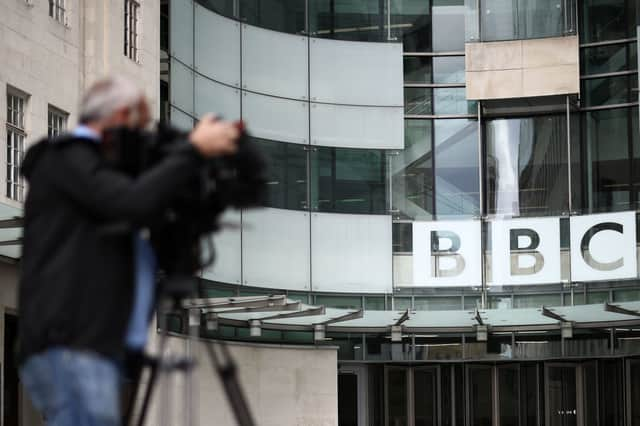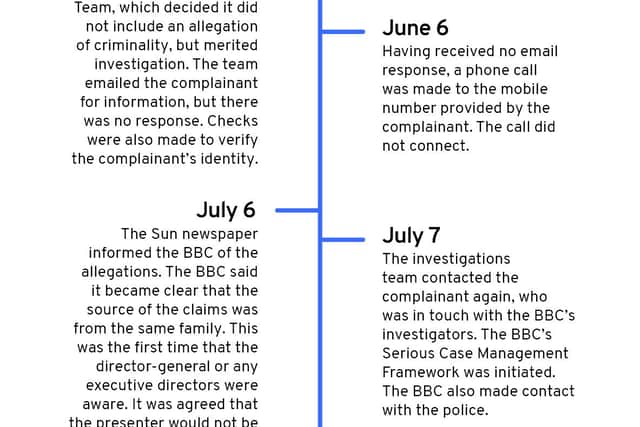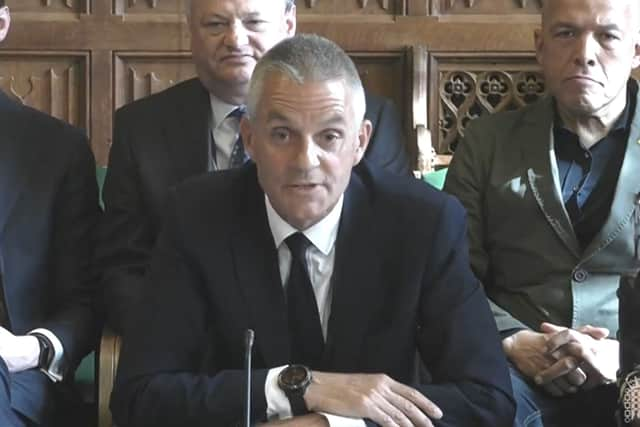Who is the suspended BBC presenter? Why male star's name has not been released amid scandal
and live on Freeview channel 276
The BBC is to meet the Metropolitan Police on Monday as the corporation deals with allegations that an unnamed presenter paid a teenager tens of thousands of pounds for sexually explicit images.
The Sun reported that the presenter at the centre of the claims paid a teenager for explicit pictures allegedly appeared in his underwear in a video call.
Advertisement
Hide AdAdvertisement
Hide AdThe corporation has been in touch with the police and confirmed a male member of staff has been suspended, while The Sun reported that the presenter at the centre of the allegations made “panicked” calls to the young person last week.
The newspaper said the presenter allegedly asked “What have you done?”, adding that it is claimed he asked them to ring their mother to get her to “stop the investigation”. According to BBC News, the corporation will meet the Metropolitan Police later “to discuss the matter”.
The presenter at the centre of the allegations has been described as a "prominent" BBC star, and is likely a name that many TV viewers will be familiar with. That's led to intense speculation online as to the identity of the suspended presenter, with other high-profile names - like Gary Lineker and Rylan Clarke - quick to confirm it is not them on social media.
But why has the person in question not yet been identified? Here is everything you need to know about it.


Why has the BBC presenter not yet been named?
Advertisement
Hide AdAdvertisement
Hide AdMark Stephens, media law expert and partner at Howard Kennedy, told the PA news agency the law was changed after Sir Cliff Richard won a privacy case against the BBC over its coverage of a South Yorkshire Police raid on his home in Sunningdale, Berkshire, in August 2014.
Sir Cliff was falsely accused of historical sex offences. He denied the allegations and was never arrested and in June 2016 prosecutors announced he would face no charges.
Stephens told PA: “Back in July 2018, the law changed in the Cliff Richard case and what was decided was that while an investigation was going on, the balance between right to privacy and freedom of expression or the public’s right to know, favoured keeping things private.
“That is why the Sun and no other newspaper has identified the presenter, and part of that was to avoid this social media frenzy with names being bandied about.


What is defamation?
Advertisement
Hide AdAdvertisement
Hide AdIt is widely acknowledged that it is within the public interest for journalists to expose those at the centre of high-profile scandals, but when tangible evidence to support a report is lacking, legal complications start to arise.
The Sun's initial coverage of the story has been described by some as "vague", and uncertainty lingers around whether the paper has actually obtained evidence substantiating the alleged payments or the existence of the alleged photograph featuring the star in their underwear.
The law of defamation safeguards an individual's reputation against the significant harm caused by lies and untruths in the media, a protection that extends to both high-profile BBC presenters and private individuals alike.
Even though the presenter is well-known, they may not be named in the news because even if the accusations turn out to be false, it could harm their reputation. The law recognises that everyone deserves a fair chance to defend themselves before being labelled as guilty.
Advertisement
Hide AdAdvertisement
Hide AdSo, until there is enough evidence to support the allegations, it is important to protect the presenter's reputation by not naming them publicly. This allows for a fair investigation to take place and ensures that innocent people are not unfairly tarnished by unverified claims.


BBC director-general Tim Davie is due to face the media on Tuesday (10 July) for a scheduled briefing following the release of the corporation’s annual report, but the growing crisis involving the unnamed presenter will dominate the event.
Davie has said he is “wholly condemning the unsubstantiated rumours being made on the internet about some of our presenting talent” after a host of famous BBC faces were forced to publicly state they are not the individual in question amid heavy speculation about the identity on social media over the weekend.
Remember that it is possible for even the 'average' social media user to defame someone on social media by spreading false information or engaging in speculative discussions that harm a person's reputation. Such speculation and making unfounded allegations could potentially constitute defamation if the statements are false and damaging to the individual's reputation.
Advertisement
Hide AdAdvertisement
Hide AdSpreading false information or making defamatory statements can have legal consequences, and it is advisable for users to exercise caution, verify information before sharing it, and refrain from making false or harmful claims about others, especially when it comes to sensitive issues like allegations of misconduct.
Presenter Nicky Campbell has appeared to suggest he had contacted police about being mentioned in connection with the story. He tweeted a screenshot which featured the Metropolitan Police logo and the words: “Thank you for contacting the Metropolitan Police Service to report your crime.”
In his tweet, he wrote: “I think it’s important to take a stand. There’s just too many of these people on social media. Thanks for your support friends.”
Presenter Dan Walker tweeted that he thought it was "very odd" to see people "still naming BBC presenters" who they think are involved in the latest scandal. "If you casually throw out the name on here then it could cost you 1000s of pounds. #Defamation"
Advertisement
Hide AdAdvertisement
Hide AdIt is “deeply unfair” BBC presenters are being forced to say they are not the man at the centre of claims a teenager was allegedly paid for explicit pictures, SNP Westminster leader Stephen Flynn has said. Speaking to the Sophy Ridge On Sunday programme on Sky News, Flynn said the BBC has a responsibility to be transparent.
“I think it’s ridiculous that you have to see the likes of Gary Lineker tweeting that he’s not the person involved here," he said. "For them as individuals that is deeply unfair, particularly given the seriousness of the issue.”
Rylan Clark tweeted: “Not sure why my name’s floating about but re that story in the Sun – that ain’t me babe. I’m currently filming a show in Italy for the BBC, so take my name out ya mouths.”
Jeremy Vine tweeted: “Just to say I’m very much looking forward to hosting my radio show on Monday — whoever the ‘BBC Presenter’ in the news is, I have the same message for you as Rylan did earlier: it certainly ain’t me.” Gary Lineker tweeted: “Hate to disappoint the haters but it’s not me.”
Comment Guidelines
National World encourages reader discussion on our stories. User feedback, insights and back-and-forth exchanges add a rich layer of context to reporting. Please review our Community Guidelines before commenting.
